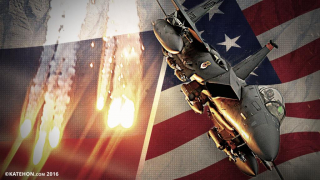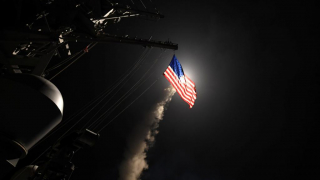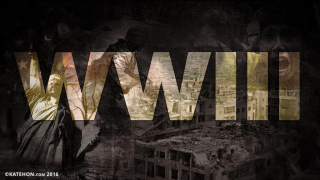Syria Under Fire: First Analysis
On April 14th, around 4:00 A.M. Moscow time, the US, France, and Britain launched missile airstrikes at military and civilian targets in Syria alleged to be producing and storing chemical weapons. Missile strikes on Damascus and its surroundings lasted around an hour. The military operation was supported by the majority of EU countries (The Netherlands, Denmark, Czech Republic, Germany, Latvia), as well as Israel, Qatar, Australia, Japan, and Turkey (various countries’ reactions to the airstrikes will be examined below). Russia, Iran, and China condemned the missile airstrikes.
The first strike: damage assessment
The US, UK, and France’s first missile airstrikes were rather improvisational and symbolic in nature.
Iranian, Russian, and Hezbollah forces were not attacked. Assad did not suffer strategically. The Syrian opposition, which expected much more, did not gain any serious advantages. Mass demonstrations in support of Assad are being held in Damascus.
Russian commentators have pointed out that France itself did not launch any missiles - all those launched were by British and American military forces.
Judging by the fact that all the missiles were launched at targets at a careful distance from the location of Russian soldiers, it seems that Mattis’ line won out in the US, as opposed to that of Bolton, who has insisted on directly attacking Iranians and Russians.
Israel also insisted on the latter.
In other words, no serious damage was inflicted in military-strategic or political terms. Moreover, 70% of the missiles were shot down, and no significant damage was done to important facilities.
Conclusion: We are dealing with a symbolic action.
Trump at a loss
Trump’s actions are undermining his authority among both his enemies (who say he has done too little) and his supporters (who elected him as an opponent of new wars and interventions). Trump’s electoral base has taken a strike to the heart. If tomorrow both globalists and populists converge in anti-war demonstrations, then this will be the end of Trump. Half-heartedness satisfies no one.
Trump is stuck between Bolton (who is the same as McCain) and Mattis, who, although a tough imperialist hawk, is a little more rational than the neocons. The option of peace has been excluded.
This might force populism to take a left turn. In this situation, Bernie Sanders is in the white, while the one in the White House has let down the hopes of the silent American majority.
Overall, one gets the impression of chaos, uncertainty, strife, and weakness in Washington. The American military’s triumphant-sounding reports that all targets were hit and that everything proceeded rapidly, suddenly, and effectively, are for the mentally challenged.
Conclusion: Trump’s positions have been weakened, and this trend will continue. Completely losing control in Washington, Trump might agree to a new war. The agony of a clown is quite dangerous.
Israel: losing its line with Russia
In many respects, the airstrikes and Israel’s support for them has weakened relations between Tel Aviv and Moscow. Iran and Hezbollah remain completely intact, whereas Israeli authorities expected another coalition attack on Iranian and Hezbollah positions. Tel Aviv pinned all hope on the Zionist Bolton prevailing and vital targets being subject to bombardment. Things didn’t work out this way. This was a risky, bet and it didn’t play out. Now they will have to pay.
The Israelis’ special relationship with Russia was an important trump card - with an influential pro-Israeli lobby hitherto entirely loyal to Putin and acting in the vanguard of his patriotic motives (such as Satanovsky, Kedmi, etc.), Israel hoped to influence Russia by depreciating and at times even blocking relations with Iran. Now this line has been broken. If Russia fully takes the side of Israel’s enemies, the situation will be qualitatively different.
Conclusion: Israel has ended up not only in the completely opposite camp from Russia, but has acted as the main instigator in a war against Russians. This has not gone unnoticed.
Turkey: Erdogan oscillated again
The new Eurasian Middle-East coalition, the Moscow-Ankara-Tehran triad, has lost a crucial partner in Turkey. Turkey’s Ministry of Foreign Affairs supported the airstrikes. Some time ago, media groups close to Davutoğlu and Gül, who were the true inspirers of the coup attempt against Erdogan, began a campaign against Russia. Now Erdogan has hesitated once again. Turkey has once again called for Assad’s overthrow.
However, Moscow believes that not everything is lost, and Putin is likely to try to establish closer contact with Erdogan to restore the Eurasian axis. In any case, Erdogan’s backwards step towards Atlanticism increases the threat of a new coup in Turkey. If he wavers, they will take him down, since the Atlanticists will never forgive his recent flirting with Russia. Erdogan has lost the trust of all sides. Since Russia allowed the Turks to take Afrin, Erdogan’s behavior can be considered a gross ingratitude akin to the downed plane.
Conclusion: Turkey’s standing has faltered considerably both in the eyes of Eurasianists and the Atlanticists.
Qatar follows Turkey
Qatar followed Turkey, not Iran and Russia. This position has been evaluated and taken into account. Qatar prepared for such a juke during the Emir Tamim Al-Thami's visit to Washington. Noted.
Lebanon: unaffected and mobilized
In this situation, Lebanon was not touched by the US military operation or Israel, has maintained allied relations with Syria, and remains an influential regional force. If everything were to finish now, Lebanon would come out as a winner and strengthen its forces in view of an almost inevitable new war with Israel.
Such a war is becoming increasingly inevitable given Israel’s aggression against the Palestinian autonomous administration. In the conditions of an Arab mobilization, Lebanon could become a springboard for a new war.
Egypt on the sideline
Egypt kept aloof of what happened and did not choose a camp. This gives Egypt an advantage and the chance to take a leading role in the Sunni world, which is especially important due to Erdogan’s new wavering.
The Saudis: expect a response
The Saudis expected that coalition airstrikes against Assad would automatically turn into a war with Iran. This did not come close to happening, and the Saudis’ role in provoking airstrikes against Syria will come back around to them. They can expect a response in Yemen and from the Russian Federation.
Macron loses face
Macron’s position was virtually a complete repeat of Sarkozy’s line on Libya - for which Sarkozy is currently being prosecuted. Macron will be prosecuted too. The whole opposition - from Marine Le Pen to Jean-Luc Mélenchon and the Republicans - has rallied against him. France’s participation in the attack on Syria in no way strengthened France’s position in the Middle East. On the contrary, this imperialist gesture is only strengthening Arabs and Africans’ resolve to fight against Françafrique from Mali to Chad.
China profits
China was not at all affected by the airstrikes, and is in the most profitable position. What really worries China is its economy and the Pacific, but any collision is still at arm’s length. Beijing has generally remained on Russia and Iran’s side, since these countries’ successes objectively strengthen China’s position without the latter risking anything. We should expect joint actions by China and Russia against the US, perhaps including their departure from the dollar zone.
Overall, the missile airstrikes against Syria have strengthened the anti-globalist bloc represented by Russia, China, and Iran. It is important to note that the authorities of the People’s Republic of China have expressed full support for Russia and the legitimate Assad government.
Conclusion: China will take an even tougher position in relations with the US
Iran: alliance strengthened
In this situation, Iran has become even closer with Russia and China. If nothing else follows these first strikes, then Iran can consider such a sign of American weakness and start strengthening its positions in the Middle East even more boldly. Russia and China are also objectively closer to Tehran.
Conclusion: If everything finishes on what happened today, then Iran is in a better position, since an ineffective threat is an excellent incentive.
Russia: transitioning to mobilization
The Russian Federation is postponing a direct reaction, but has drawn all the necessary conclusions. Syria’s anti-missile defenses proved effective. None of its radars were damaged, unlike in Yugoslavia in 1999, when NATO immediately disabled radars, thus paralyzing the entire air defense system. Russia can keep giving C-300’s to its allies, and the situation will be all the more predictable. Obviously, such an experience will not be forgotten, and the lives of American troops in Eastern Syria will be difficult from here on out.
It is clear that Moscow will reconsider its attitude towards Turkey’s actions in Northern Syria. In general, relations between Moscow and Ankara are now like how they were after Turkey downed the Russian plane. In one gesture, Erdogan has destroyed everything that he achieved on the Eurasian front. Putin will try to rebuild the alliance, but this would probably require something similar to the dramatic events of July 2016. Erdogan has once again made an Atlanticist turn. He won’t have to wait long for the consequences of such.
After the complete liberation of Ghouta, another direct confrontation and repeat staged chemical attacks can be expected during operations in Southern Syria, in Daraa.
Overall, if this is it, then Russia has emerged victorious with no losses and no Third World War. Sure, some allies have fallen away, but this only strengthens Russia. Russians can fight and endure difficulties alone best of all. However, there will be a cost for this, as has happened more than once before.
Another matter is if this is not all, and if the Atlanticists will make another move. If they do, then we will continue our analysis.
At any rate, Putin is henceforth compelled to sharply switch to mobilization mode, and this cannot but affect Russia’s authorities. A new wave of purges will clearly hit the Sixth Column. This will affect the government as well, which will have new personnel after May 7th.
Conclusion: Overall, the situation after the first missile airstrikes on Syria is a testimony to the global weakness of globalist domination. If this does not turn into the beginning of a Third World War, then it will be a victory for the multipolar world, that of Russia, Iran, and China.
Translated by Jafe Arnold














